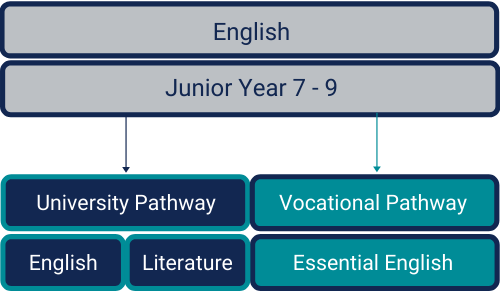Subject description
The study of English requires students to engage with a variety of texts to interpret, create, evaluate and discuss meaning in a wide variety contexts. These include literary texts and various types of media texts, including newspapers, film, fiction, poetry, dramatic performances and multimodal texts. Abstract themes and issues are explored through higher order reasoning and critical analysis.
Out of class requirements
In an average week, students will need to complete 1-2 hours of homework and/or revision of in-class content. During assessment weeks, some class time will be used for drafting and conferencing but students will need to complete additional drafting and prepare their final submission at home.
What’s important for this subject
The Australian Curriculum determines three important strands of knowledge in the study of English:
Language: knowing about the English language.
Literature: understanding, appreciating, responding to, analysing and creating literature.
Literacy: expanding the repertoire of English usage.
Course Outline & Assessment
|
Unit 1 - Perspectives in Texts |
Students explore Australian texts contributing to the conversation around what it means to be an Australian.
| Through film, students understand that identities and cultures have been, and are, a source of strength and resilience for First Nations Peoples against historic and contemporary impacts of colonisation.
|
| Unit 2 - Texts in Culture |
In this unit, students compare interpretations of poetry to evaluate meaning. With analysis of figurative language at its core, the unit has a literary focus that is essential for success in future study.
| A study of power dynamics in social media culture, this unit questions social, economic and political impact of new media and social networking on individuals and groups.
|
Unit 3 - Text Connections
|
Through engaging with texts, students will explore the perspective of characters in a novel.
| An introduction to Shakespeare that focuses on how modern texts borrow narrative elements from The Taming of the Shrew. Students produce a feature article exploring the variance of cultural representation.
|
| Unit 4 - Literary Texts |
Cultural experiences are explored through literary appreciation. In "12 Angry Men", values, attitudes and beliefs are represented through the words and deeds of characters in the fictional world.
| Through exploring a novel, students will investigate cultural assumptions, attitudes, values, and beliefs present in the novel.
|
|
English (B semesters 1 & 2, year 10) | Essential English (no pre requisite)
|
Various short story writing competitions
Premier’s Reading Challenge |
